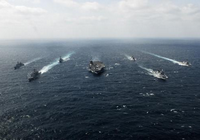It was recently reported that Somali pirates have been holding the crew of the North Korean cargo ship Chilsanbong Cheonnyeonho since it was captured last March. Ten months on, the ship remains detained, with hefty ransom demands likely still outstanding. With no records for the vessel found at maritime insurance tracker Seasearcher, the possibility that its crew may now be facing abandonment is becoming ever more likely. However, given South Korea's dramatic rescue of one of its own vessels captured by pirates in January, the case of the Chilsanbong now offers the Koreas an opportunity for military cooperation at a time of increasing tension.
Thanks to close-range combat skills accrued from decades of training to fight North Korean ships, South Korea's raid in January was a major success, resulting in the death or capture of 13 Somali pirates and the rescue of all 21 hostages. In a further show of firm-handedness, South Korea quickly flew the captured pirates to Seoul to face trial. The well-publicized rescue mission may have been an intentional attempt by South Korea to restore naval deterrence over North Korea following the sinking of the Cheonan and the shelling of Yeonpyeong Island by North Korean artillery. Domestically, it may have also helped improve the South Korean navy's credibility, with the Asia Times suggestingthat the bold operation would, at least temporarily, "silence domestic criticisms" of naval competence.
North Korea has had nine of its vessels captured since 2006, and paid $3.5 million to free the North Korean-crewed MV Theresa VIII last year. With last week's inter-Korean military talks ending in debacle, Pyongyang could now be considering its own brazen rescue mission, for similar reasons. Such an operation could conceivably kill two birds with one stone. A high-profile and successful operation would send a chilling message to Seoul -- without the risk accompanying a direct provocation -- while also increasing North Korea's bargaining power in future military talks. However, this outcome remains highly unlikely, as Pyongyang knows.

